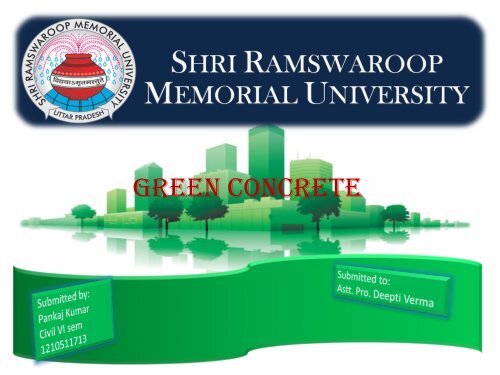greenconcrete-140529110852-phpapp01
You also want an ePaper? Increase the reach of your titles
YUMPU automatically turns print PDFs into web optimized ePapers that Google loves.
GREEN CONCRETE
1. What is Green Concrete ?<br />
2. Where does the Carbon Dioxide come from in concrete ?<br />
3. Features of Green Concrete<br />
4. Materials for Green Concrete<br />
5. Cementitious materials - Fly Ash<br />
6. Advantage Of Green Concrete<br />
7. SUITABILITY OF GREEN CONCRETE IN STRUCTURES<br />
8. SCOPE IN INDIA
What is Green Concrete ?<br />
Green Concrete is environmental friendly concrete.<br />
Concrete that uses less energy in its production<br />
& produces less carbon dioxide than normal<br />
concrete is Green Concrete<br />
3
Where does the Carbon Dioxide come from in<br />
concrete ?<br />
i) Cement:<br />
Most of CO2 in concrete is from the cement manufacturing process. A<br />
typical cubic meter of concrete contains about 10% cement by weight. The<br />
reaction in the process of Cement manufacture is:<br />
ii) Aggregate:<br />
Use of virgin aggregates contributes about 1% of all CO2 emissions from a<br />
typical cubic meter of concrete. Therefore, the use of alternate aggregate is<br />
desirable. The use of local and recycled aggregates is desirable as it can<br />
reduce transportation and fuel cost and support sustainable development.<br />
4
Features of Green Concrete<br />
The concrete which can fall in the category of green must have the<br />
following characteristics.<br />
‣ Optimizes use of available materials<br />
‣ Better Performance<br />
‣ Enhanced cohesion workability / consistency<br />
‣ Reduced shrinkage / creep.<br />
‣ Durability - Better service life of concrete<br />
‣ Reduced carbon footprint<br />
‣ No increase in cost<br />
‣ LEED India Certification<br />
Green concrete mix is designed with the principle of "Particle-Packing<br />
Optimization" to meet requirements of plastic and hardened properties.<br />
5
Materials for Green Concrete<br />
Green construction materials are composed of renewable, rather than non<br />
renewable resources. Green materials are environmentally responsible<br />
because impacts are considered over the life of the product. Depending<br />
upon project-specific goals, green materials may involve an evaluation of<br />
one or more of the following criteria.<br />
1. Locally available<br />
2. Salvaged, re-furnished, or re-manufactured<br />
3. Reusable or recyclable<br />
6
Coarse Aggregates are:<br />
Materials for Green Concrete<br />
Fresh Local Aggregate<br />
Recycled Demolition Waste Aggregate<br />
Recycled Concrete Material (RCM)<br />
Blast Furnace Slag (BFS)<br />
7
Fine Aggregate s are:<br />
Materials for Green Concrete<br />
Manufactured Sand For Concrete<br />
Recycled Glass Aggregate<br />
Blast Furnace Slag (BFS)<br />
Fly Ash<br />
8
Cementitious materials - Fly Ash<br />
Fly ash is a by-product produced during the operation of coal-fired power<br />
plants. The finely divided particles from the exhaust gases are collected in<br />
electrostatic precipitators. These particles are called Fly ash.<br />
Advantages Of Using Fly Ash in Concrete:<br />
1. Utilization of fly ash as a part replacement of cement or as a mineral<br />
admixture in concrete saves on cement and hence the emission of<br />
CO2.<br />
2. Use of good quality fly ash in concrete has shown remarkable<br />
improvement in durability of concrete, especially in aggressive<br />
environment.<br />
3. Some of the technical benefits of the use of fly ash in Green Concrete<br />
are:<br />
a) Higher ultimate strength<br />
b) Increased durability<br />
c) Improved workability<br />
d) Reduced bleeding<br />
e) Increased resistance to alkali-silica reactivity.<br />
f) Reduced shrinkage.<br />
9
Advantage Of Green Concrete<br />
1. Optimized mix designs mean easier handling, better consistency and<br />
easier finishing.<br />
2. Reduction in shrinkage & creep.<br />
3. Green Concrete uses local and recycled materials in concrete.<br />
4. The heat of hydration of green concrete is significantly lower than<br />
traditional concrete.<br />
5. This result in a lower temperature rise in large concrete pours which<br />
is a distinct advantage for green concrete.<br />
10
11
SUITABILITY OF GREEN CONCRETE IN STRUCTURES<br />
Several factors which enhances the suitability of green concrete in<br />
structures include:<br />
1. Reduce the dead weight of a structure and reduce crane age load; allow<br />
handling, lifting flexibility with lighter weight.<br />
2. Good thermal and fire resistance, sound insulation than the traditional<br />
granite rock.<br />
3. Improve damping resistance of building.<br />
4. Reduction of the concrete industry's CO2-emission by 30 %.<br />
5. Increased concrete industry's use of waste products by 20%.<br />
6. No environmental pollution and sustainable development.<br />
7. Green concrete requires less maintenance and repairs.<br />
8. Compressive strength behaviour of concrete with water cement ratio is<br />
more than that of conventional concrete.<br />
9. Flexural strength of green concrete is almost equal to that of<br />
conventional concrete.<br />
12
SCOPE IN INDIA<br />
Green concrete is a revolutionary topic in the history of concrete industry.<br />
As green concrete is made with concrete wastes it does take more time to<br />
come in India because of industries having problem to dispose wastes and<br />
it also reduces environmental impact with reduction in CO2 emission. Use<br />
of green concrete can help us reduce a lot of wastage of several products.<br />
Various non-biodegradable products can also be used and thus avoiding the<br />
issues of their disposal.<br />
13
14


